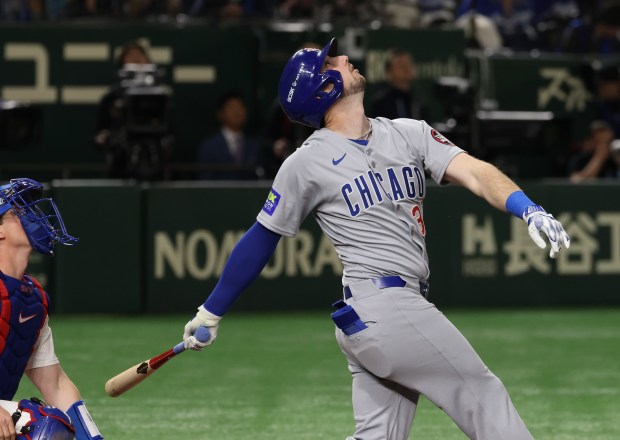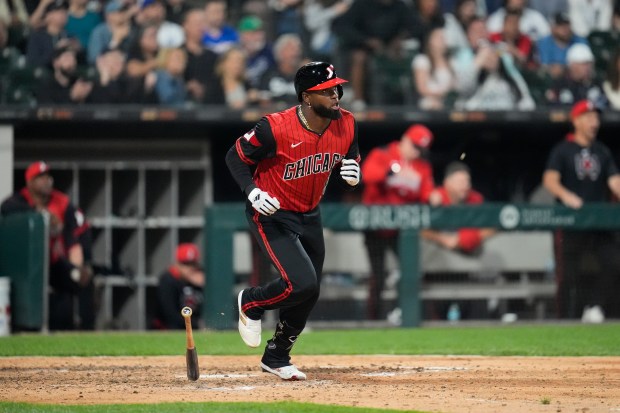PHOENIX — Kyle Tucker likes to keep things simple when it comes to hitting.
The Chicago Cubs right fielder prefers getting his pregame work done in the indoor batting cage and doesn’t usually take on-field batting practice. As he came up through the Houston Astros minor-league system and early in his big-league career, Tucker discovered he preferred the controlled environment of the cage where he could manage the pace and tinker as needed.
It’s an approach he brought with him to his new organization — the Cubs resume their season Thursday night against the Arizona Diamondbacks at Chase Field — and the coaching staff has fully supported what Tucker and his teammates are most comfortable with to be prepared to perform.
“Everyone’s a little different, everyone kind of goes about their business a little differently, and over however many years I’ve been playing, I kind of figured out stuff that I like to do, stuff I think isn’t as necessary, that I just feel comfortable with going into a game and feeling confident when I do go out there,” Tucker told the Tribune this spring in Mesa, Ariz. “I mean, it’s changed over time, but I try not to make it any harder than it has to be while also still getting in the work. I just try and simplify stuff as much as possible.”
Ian Happ was part of the same 2015 draft, selected by the Cubs four spots after the Astros made Tucker the fifth pick. Happ remembered being part of a predraft workout with Tucker at Wrigley Field and taking notice of the unique swing that has been so effective throughout Tucker’s career. It ties together with his more simplistic approach.
“He’s not not trying to do a bunch of different things,” Happ said. “He believes in who he is as a player and what has gotten him here. And I think it’s really easy when you go to a new place to try to please people or change to fit in and he’s fit in seamlessly, but at the same time, he’s doing what he’s always done, preparing himself for the season.
“I can appreciate that, and I think that’s what makes him really good. He’s not chasing anything. He knows what it takes.”
Tucker’s swing path reminds hitting coach Dustin Kelly of legends such as Jackie Robinson and Hank Aaron, both of whom had the barrels of their bats go backward and lay off as they loaded.
“There’s some old-timers that did it, and my theory used to be that it was a big, heavy bat that those guys used to have to swing to get on a plane, but that’s not his, that’s not the case,” Kelly said this spring of Tucker. “That’s just his natural swing, and he said he’s hit like that forever.
“A lot of hitters that you see, they kind of maintain the same distance from their hand to their shoulder as they start to rotate, his kind of lays off. … It works for him, and it works really well.”
It’s not the type of swing approach a coach would teach a young hitter, but it fits with how Tucker’s body naturally moves, which allows him to set his bat a little flatter. His uncommon bath path and mechanics clearly haven’t affected his ability to hit for power.
In the last five years, Tucker has hit 127 doubles, 15 triples and 121 home runs in 583 games with an Isolated Power (ISO) of .246 in that span, tied with Mookie Betts for 13th best in the majors, right behind Juan Soto (.247) and Bryce Harper (.249).
“He rotates really, really good so he creates a ton of rotational, like, not a crazy amount of linear bat speed — it’s not going to go off the charts on Statcast,” Kelly said. “But the way that he rotates creates a ton of force going forward.”
When things are going well at the plate, everything within the swing is synced without Tucker needing to overthink or dwell on the process. The most important part to staying within himself, Tucker explained, is not dipping his back shoulder, which can cause an uppercut swing that causes him to roll over the baseball.
“Just trying to make that not drop and be a little bit more flat and then just staying through the ball up the middle with intent,” Tucker said. “For the most part, if you have that going everything else kind of syncs up, at least that’s how I think about it.”
The Cubs acquired Tucker to be a difference maker in the middle of the order, trading away a lot — third baseman Isaac Paredes, right-hander Hayden Wesneski and prospect Cam Smith, who made the Astros’ opening-day roster — to acquire an impact bat. Tucker’s quiet spring aside — he was 3-for-30 with one home run, six walks and nine strikeouts — his performance in his final season before free agency likely will be closely tied to the Cubs’ success.





